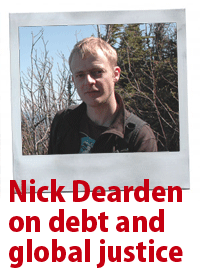Gordon Brown’s conversion to financial regulation this weekend is certainly better late than never. He has joined a wide range of statesmen who, despite their role in maintaining “hands off” global finance, have come to see the error of their ways.
In May the great and the good of European social democracy, led by Jacques Delors and Jacques Santer, both former Presidents of the European Commission, declared in a letter that “Financial markets can not govern us!”.
In fact much of the world has been governed by financial markets for decades, and the severe poverty which still exists in so many developing (and indeed developed) counties can in no small measure be laid at the door of all-powerful financial globalisation. Indeed the freeing up of the financial sector – to be as reckless as it chooses – has been the real essence of the globalisation project over nearly 30 years.
Real progress towards solving the world’s problems, poverty or climate change most prominently, would mean that the vast bailouts and injections of money that have been announced in recent days were not merely another form of ‘socialism for the rich’, but used to fundamentally reform global financial architecture.
A little discussed conference taking place in Doha in late November is a perfect opportunity for Brown to show his new-found credentials. The UN’s second Financing for Development conference will discuss the principles that should underlie aid, debt relief and funding for climate change. While campaigners currently fear the conference may represent a step backwards from the first conference held in Monterrey in 2002, it does have the potential to show the ‘have-nots’ of the world that global leaders are serious.
The starting point is the fact that financial globalisation allows massive transfers of money from developing to developed countries, with unprecedented ease. What in times past would have required guns boats and armies can now be achieved with a few clicks of a mouse.
To give a few examples, $160 billion is lost to the developing world every year through tax evasion, based on the fact that most trade takes place within global corporations and those corporations now have the ability to move that money around the world with few restrictions or questions asked. $250 billion is lost because $11.5 trillion of global assets are currently held in tax havens, like the UK, one of the centres of financial globalisation.
The global money markets turn over a mind-blowing $3.2 trillion every day – much of which is so-called ‘hot money’, speculative capital which moves very rapidly in and out of countries and currencies, causing immense damage. Indeed currency speculation played a large role in the South East Asian crash in 1997. Another $1.6 billion a day is transferred from poor to rich countries in debt ‘repayments’, based largely on loans recklessly thrust on newly independent countries in the 1960s and 70s by financial institutions which promptly raised interest rates to extortionate levels.
Needless to say these gigantic sums dwarf aid budgets.
Solutions to run-away finance are out there. A Currency Transaction Tax could be introduced to reduce volatility on the money markets or a restriction placed on the selling of developing country debt on secondary markets which would prevent ‘vulture funds’ profiting from the misery of developing countries.
It would be possible to prevent ‘capital flight’ removing the ability of countries to effectively tax corporate and individual activities within their jurisdiction through better policing and control of financial flows, allowing the international community to effectively shut down tax havens. A fair, transparent and participative mechanism could be introduced to work-out debt disputes and reduce the dependence of developing countries on financial markets and unelected, unaccountable organisations like the Paris Club.
These would be just the first reforms that would be necessary to put finance back in its box, return sovereignty to nations, and ensure a more equitable future for everyone.
The financial crisis does not mean that these solutions will be adopted, but there is an opening. Unfortunately many in the world of finance will push for business as usual as soon they have offloaded their problems onto the suddenly-so-necessary state. But there is now an opportunity. Last Thursday the Financial Services Authority temporarily banned some short-selling. Despite a few howls from the unruly children unable to take their medicine, the financial system has not collapsed, as would have been predicted in earlier times. So it has been proved that it is possible to intervene to stop unhelpful types of speculation. Much more unorthodoxy will also be proved in coming months.
What happens next is up to us. Public intervention is busy changing private debt into public debt. The price the public demands for this service should be clear – to re-take control of a financial sector which has caused so much misery for so long.
This article was first published on New Statesman online.
Wednesday 24 September 2008
Subscribe to:
Posts (Atom)

